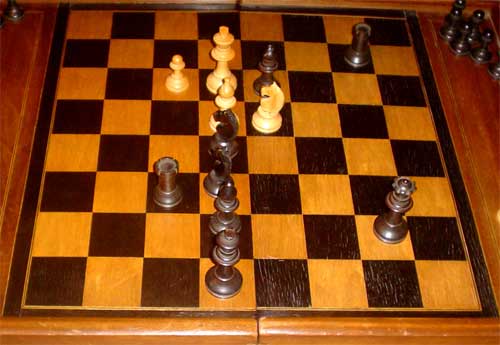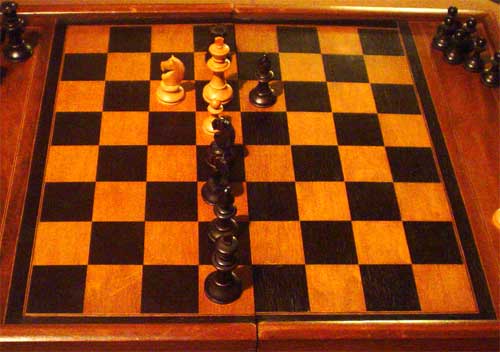| |
After Sunset
NOTE: We advise reading this story with a chess set at hand so you can
actually play out the last part. Acknowledgements: Galerius and Greedo.
"Do you play chess?" I asked, pointing at the beautiful chess
set adorning the coffee table. The wooden board was about a hundred
years old, of a type used in certain bistros at that time. The pieces
were made of turned wood.
"Not really," replied the Collector, "It's more a souvenir
than a collector's item. In fact, the story isn't really about me, but
one of my friends, Vincent D."
"You see, back in the seventies, my friend Vincent was a regular
at The Greenwich, a quaint café in central Brussels where the
clientele would often play chess – in fact they still do.
Vincent was an excellent player, capable of pulling off the most outlandish
moves. He would generally go there on Saturdays in the early afternoon
to play a few games. Then afterwards, we would meet for a drink and
talk about magic and the rare objects that can be found at the city's
flea markets.
But on that particular day, the day of our weekly get-together, my friend
looked like an anaemic zombie! He was deathly pale and had dark rings
around his eyes, as if he hadn't slept in a week.
Worried, I asked him if he was feeling alright. He replied that for
the last few days he had been squaring off against a formidable opponent
in games that left him exhausted by the time the pub closed. Mr Karl
Josef Batthyàny, aka 'The Count', was a venerable gentleman and
a descendant of the old Hungarian nobility. He was not only a formidable
opponent, but at the end of each game, when the players traditionally
shake hands, he seemed to literally drain my friend of all his remaining
energy. A few weeks before, one challenger who had taken on The Count
died of a heart attack right in the middle of a game. Naturally, that
tragic event caused no small measure of anxiety amongst the gently ageing
denizens of the café and shrouded The Count in an aura of misfortune.
I probed my friend for more information and details to help me get a
handle on his adversary.
Vincent said he had trouble concentrating when playing the old man and
that at critical points during the game he would make poor moves, totally
contrary to his usual mode of play. He also said that Mr Batthyàny
always showed up at The Greenwich after sunset and left later at night.
I suggested that I come along that very evening to watch one of their
games, giving me a chance to observe this curious character.
The sun had already made its daily plunge over the horizon when a fragile
old man with a refined air about him stepped through the door of the
café. He was short and stooped, dressed in an old, worn frock
coat, a waistcoat and an ascot tie; he looked like he had stepped straight
out of a bygone era. His shoes must have walked more than a million
miles, but he had a certain natural elegance about him. He removed his
coat and politely greeted everyone present, then headed for our table.
Vincent stood up and introduced me to The Count, who shook my hand.
His hand was delicate, with translucent skin as thin as cigarette paper.
Glancing at his face, I was taken aback to see it was dark blue, like
a deep volcanic lake, but offset by blood-red pupils. He ordered a tea
with lemon, which he sipped delicately, ignoring the sugar and accompanying
biscuit.
After the customary chit-chat, Vincent opened up a chess set –
the very one you see here – and set up the pieces. The game began.
Initially, my friend played with his typical brilliance. It looked to
me like he would make quick work of the old man. He won the first two
games without much difficulty. But then he slowly started to get distracted
and make mistakes, and the next game was a draw. He then lost a game
and never managed to regain his form. As I observed Mr Batthyàny,
I was struck by an image from The Man of the Crowd, by Edgar Allan Poe,
a story about a psychic vampire who draws sustenance from the energy
of others. The texture of his skin had improved and he was sitting more
upright than earlier in the evening. In fact, he now had the look of
a nocturnal predator who had settled on my friend as his prey.
I secretly signalled Vincent, who suggested taking a break before playing
the final game. The Count agreed and decided to pay a visit to the gents.
I told Vincent what I had observed and insisted that he stop playing.
He said he was unable to stop; he was visibly subjugated by the Hungarian.
I knew then that the spell had to be broken at all costs.
And then I had a rather original idea. If it worked, his opponent would
be very surprised indeed…
The last game began. It was obvious that Vincent was slipping drastically.
He lost his queen, his rooks, a knight and a bishop – not to mention
nearly all of his pawns. The Count had not lost a single piece!
By that point in the game, the layout of the board was just as you see
here. There was simply no way my friend could win:

Vincent was playing White: King e3, Bishop e4, Knight
d4, Pawn f3
Batthyàny was playing Black: King e8, Queen b7, Bishop d3, Bishop
e7, Knight e5, Knight e6, Rook b2, Rook f6
He looked triumphant at Vincent, holding out his hand for the customary
handshake.
Then, abruptly, his smiled disappeared. His hand remained frozen above
the board.
Looking down at the pattern formed by the chess pieces on the board,
he saw a perfect cross.

Instantly, he seemed to deflate. He got up, rushed out
of the café and disappeared into the inky night – never
to be seen again at The Greenwich.
|








